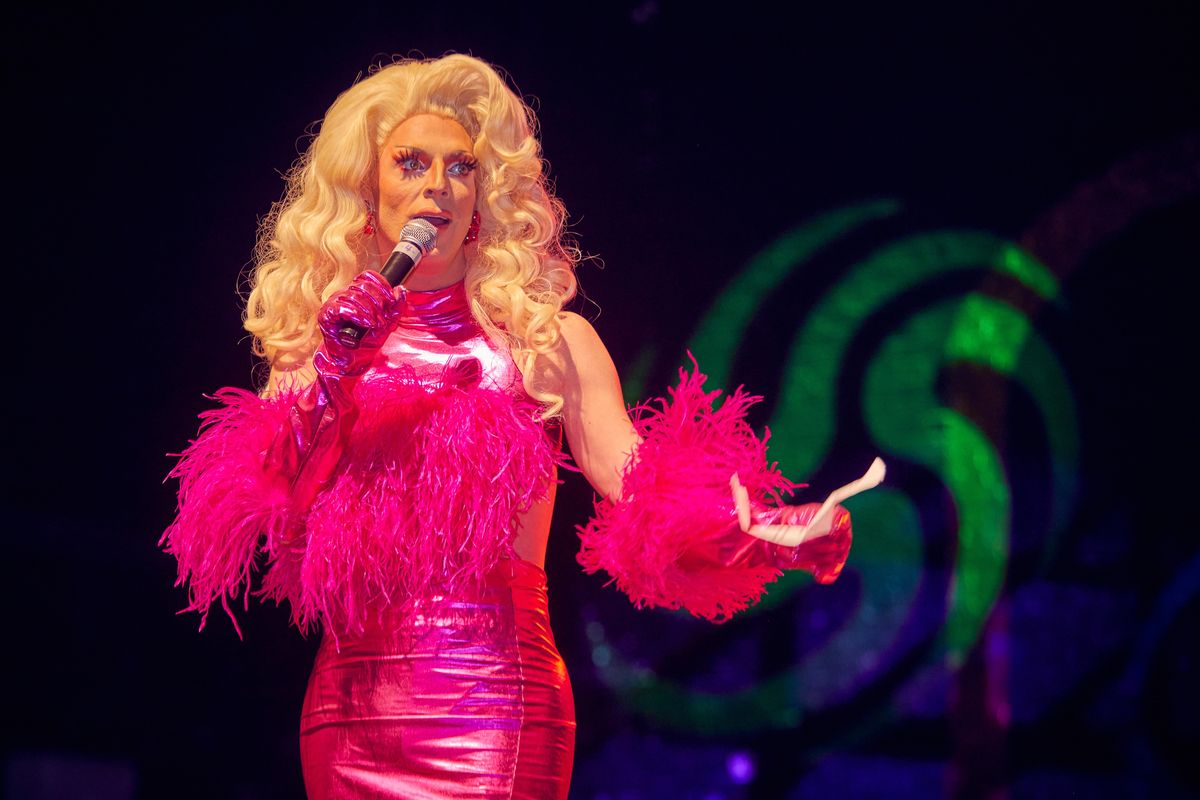New Documentary Shines Light On Canada’s Queer Nightlife History
Venus Envy, which premiered this week at Montreal’s Image+Nation festival, tells the story of a queer multimedia art collective, House of Venus, that made its mark on music and art across the country.

Gisèle Lullaby at the Premiere of Venus Envy
Venus Envy puts the spotlight on queer collective House of Venus, trailblazers in Canadian nightlife who built scenes for outsiders across the country.
Directed by Michael Venus, founder of the House of Venus — also known as his alter ego, Venus Girl Cotton — the documentary (available to watch here) tells the story of how the collective grew from a few friends in Windsor to a major force in Canadian nightlife and media during the late 90s and early 2000s, encompassing fashion shows, album releases and the collective’s own sketch comedy show.
Venus Envy premiered this week at Montreal queer film festival Image+Nation — with a party at the Imperial Theatre hosted by Canada's Drag Race winner Gisèle Lullaby — and is heading to Vancouver next for a screening at the Rio Theatre on Feb. 25. Directed by Venus himself, it’s packed with archival footage: club nights, drag performances, fashion shows, Super 8 short films, and many many headpieces from House of Venus’ annual Wiggle Festival, which celebrates wearable art.
“We almost documented everything, starting at the very beginning in the early ‘90s,” Venus explains. “We didn’t have documentation for all of the parties, clearly — which is probably a good thing to be honest,” Venus laughs.
The collective emerged out of the need for a creative, queer space in the border town of Windsor. “We’d get bored on the farm,” says Venus in the first minutes of the documentary, explaining why he began performing as a kid in rural Ontario. Venus and his co-founder Greg George began sewing their own outfits and hosting events in Windsor when Venus was in his teens. They soon decided they were ready for something bigger, and in 1995 the collective moved to Vancouver where they started throwing after-hours parties.
House of Venus DJ Dickey Doo focused on spinning underground dance music, highlighting house and other newer genres of dance music for partygoers. The collective was inspired by the experimentations of Andy Warhol and the thriving club scenes in New York and Chicago, aiming to bring those innovations north of the border.
“In Vancouver, we created a whole new scene,” Venus says. “Coming out of the '80s, coming out of the AIDS pandemic, it was a safe space for people,” he continues. “It was about bringing new music, it was about bringing new ideas, it was about gender expression, it was about freedom — allowing folks to be who they wanted.” The House of Venus scene had a different take on drag than the campier style that preceded it, focussed more on high fashion, performance art and gender fluidity.
Before long, House of Venus was putting on events at some of the city’s most popular clubs and bringing in big names from out of town, like Chicago producer and Beyoncé collaborator Honey Dijon and Berlin DJ and electroclash influencer Larry Tee. “Michael Venus is kind of the Kim Kardashian of the House of Venus,” Tee tells the camera in Venus Envy. “The House of Venus was a way to expose the exciting side of music, art and culture,” Tee continues, “it was like a special little boutique of madness in Canada.”
As more money came into Vancouver in the 2000s, the scene changed. Michael Venus eventually relocated to Montreal, where he served as Executive Director of the gallery space and event promoter Never Apart. Never Apart carried on House of Venus’s spirit of highlighting groundbreaking queer artists — their Legend Series featured icons like Canadian feminist musician Peaches as well as John Waters mainstay Mink Stole. The documentary concludes with footage from Wiggle Festival’s 25th anniversary events in 2019, featuring performances at the Never Apart space and a Pride Parade collaboration with the Montreal Museum of Fine Arts.
Venus is also releasing a limited pressing of the documentary’s original soundtrack, featuring a score by Dickey Doo and new and old recordings from the House of Venus members. “We were involved in so many different types of music over the decades,” Venus says. “Electroclash, to goth, to obviously house music and techno and disco, so there’s a little bit of everything on this album.”
Beyond putting all that archival footage to use, Venus Envy is a testament to the resourcefulness and influence of underground queer cultures. “Folks don’t really think of Canada as like a fashion forward, cutting edge art scene per se, and I think that it’s important to know that there was this underground scene,” he says.
“There’s a whole generation of people that are growing up with despair, and eco anxiety, and fear to be who they are because of persecution. So it’s important to show that a bunch of kids had a dream and just did it.”
Venus Envy is available to watch as part of Image+Nation's online programming until Sunday, Dec. 3.
















